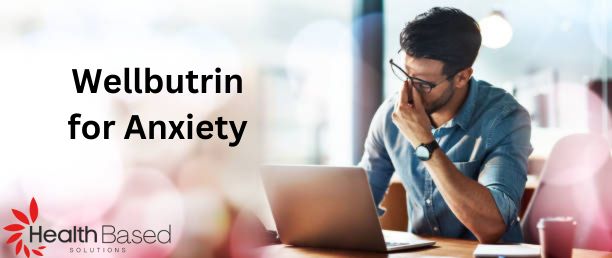Introduction
Anxiety can be overwhelming, but treatment options like Wellbutrin (bupropion) are offering new hope. While originally designed as an antidepressant, Wellbutrin has shown promise for individuals seeking relief from anxiety, particularly when traditional medications fall short. Let’s explore how this medication works, its benefits, potential side effects, and more. So stay, connected with us, and keep reading to improve your anxiety symptoms and support mental health.
What is Wellbutrin (Bupropion)?
Wellbutrin, also known by its generic name bupropion, this famous drug is a prescription medicine primarily used to treat depression. Unlike traditional antidepressants, it works on dopamine and norepinephrine rather than serotonin, which sets it apart as a unique option for managing certain mental health conditions.
How Wellbutrin works
Wellbutrin effect your brain neurotransmitters by boosting norepinephrine and dopamine levels. These chemicals are crucial for your mood regulation and focus. Its unique mechanism makes it a viable option for those who haven’t responded well to serotonin-focused treatments.
Is Wellbutrin effective for anxiety?
While Wellbutrin isn’t FDA-approved specifically for anxiety, studies suggest it can help some people. It is particularly effective for individuals who experience anxiety alongside depression. However, its stimulating effects might exacerbate anxiety in certain cases.
Advantages of using Wellbutrin for anxiety
Non-addictive: Unlike benzodiazepines, Wellbutrin doesn’t pose a risk of dependency.
- Minimal sedation: It won’t leave you feeling groggy, making it ideal for active lifestyles.
- Dual benefits: It addresses both depression and anxiety, a common co-occurrence.
Potential side effects of Wellbutrin
Every medication has potential downsides. Common side effects include:
- Insomnia
- Dry mouth
- Nausea
Rare but serious effects, like seizures, are less common but should be discussed with a doctor.
Who should consider Wellbutrin?
Wellbutrin may be suitable for those experiencing anxiety alongside depression or for those who’ve struggled with traditional anti-anxiety medications. It’s also an excellent choice for individuals seeking a non-sedative option.
Who should avoid Wellbutrin?
People with a history of seizures, eating disorders, or severe liver disease should avoid Wellbutrin. Always consult your provider to determine if it’s accurate for you.
Comparing Wellbutrin to other anxiety medications
Unlike SSRIs, which focus on serotonin, or benzodiazepines that sedate, Wellbutrin stimulates. This difference can be a benefit or a drawback, depending on individual needs.
Lifestyle tips to maximize benefits
Wellbutrin works best when it is combined with healthy habits including:
Exercise frequently: Physical activity can boost your mood and ease anxiety symptoms.
Therapy: Cognitive-behavioral therapy complements medication well.
Healthy eating: Nutrient-rich foods can support your overall mental health.
Dosage and administration
Typical dosages vary but often start at 150 mg daily. Always follow your doctor’s guidance and never adjust your dose without consulting them.
Interactions with other medications
Like any drug Wellbutrin can also interact with other drugs, including MAOIs and some seizure medicines. Sharing a complete medication list with your doctor is essential for safety.
Success stories and experiences
Several people have found aid with Wellbutrin, particularly when other treatments have failed. Personal accounts highlight its ability to improve focus and lift mood, with some noting a reduction in anxiety symptoms.
Myths and misconceptions
Myth: Wellbutrin is only for depression.
Fact: It has off-label uses, including anxiety treatment.
Myth: It’s addictive.
Fact: Wellbutrin is non-addictive.
FAQs about Wellbutrin for anxiety
1. Can Wellbutrin worsen anxiety?
For some, its stimulating effects can increase anxiety. Discuss concerns with your doctor.
2. How long does it take to see results?
Most people notice improvements within 4-6 weeks.
3. Can Wellbutrin be taken with other anxiety medications?
Yes, but only under your provider’s supervision to prevent interactions.
4. Is Wellbutrin suitable for long-term use?
Many use it long-term with success, but regular evaluations with a doctor are crucial.
5. Can I stop taking Wellbutrin abruptly?
No. Stopping suddenly can cause withdrawal symptoms. Always taper under medical guidance.
Conclusion
Wellbutrin offers a fresh perspective for anxiety treatment, especially for those who haven’t found success with traditional options. Its unique mechanism, combined with its benefits, makes it a worthwhile consideration for many. Make an immediate appointment with your provider for personal advice if experience persistent or worsen symptoms.








